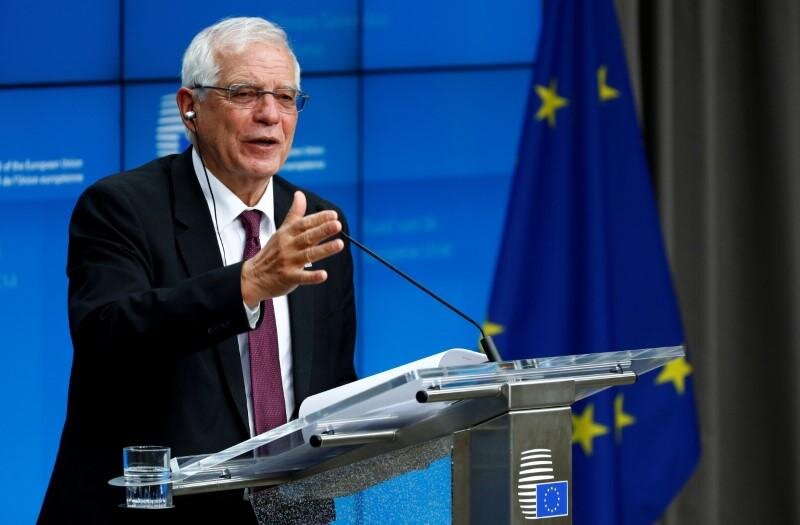
- ARAB NEWS
- 01 Jul 2025

Seven countries were involved when the Joint Comprehensive Plan of Action (JCPOA), aka the Iran nuclear deal, was completed in 2015: The Islamic Republic and the P5+1 (the US, China, Russia, the UK, France, and Germany). But two of the most important players, who led the negotiations and finalized the deal, were the US and Iran.
The Trump administration subsequently withdrew from the nuclear deal in May 2018 and Tehran abandoned its commitments under it this month. With the two major state actors having withdrawn from the JCPOA, one would assume that it ought to be officially considered null and void.
But the E3 (the UK, France and Germany) still appear to be reluctant to abandon the deal. EU foreign policy chief Josep Borrell said last week that the three European powers have “reconfirmed their determination to preserve the agreement, which is in the interest of all,” and they agreed that “more time is needed due to the complexity of the issues involved.” He added that: “The timeline is therefore extended.”
However, since Tehran is not adhering to the terms of the JCPOA anymore, it is hard to imagine there is actually any “complexity” in the issue. The truth is that, since the Trump administration withdrew the US from the deal, the flawed agreement has been kept on life support by the European signatories. Still Tehran has consistently pushed for the E3 to do more — more than they are capable of delivering, many would argue.
The European nations are still working to improve the special purpose vehicle known as INSTEX, which they hope will allow businesses to continue trading with Iran despite US sanctions. Its implementation, however, has been fraught with difficulties. It seems that the more the Iranian regime becomes defiant, the more the European officials make efforts to ensure that sanctions reliefs are in place and INSTEX is viable and can provide some protection for the regime’s economy. This is precisely the reaction that Iranian leaders look for.
The E3 are undermining their diplomatic initiatives and leverage by submitting to Iran’s demands and cowering to its extortion.
Britain did recently raise the possibility of a new “Trump deal” to replace the JCPOA, but Iran’s Foreign Ministry spokesman Abbas Mousavi rejected the possibility of any alternative agreement. Of course, the regime would not mind returning to the flawed JCPOA if the US lifted all of its sanctions. After all, the terms of the nuclear deal were heavily in favor of the Islamic Republic: The sunset clauses would have removed the restrictions on Iran’s nuclear program after the expiration of the deal, while military sites such as Parchin, which is reportedly where the regime’s nuclear development and research is conducted, were out of the reach of International Atomic Energy Agency inspectors. There was also no reference to Iran’s ballistic missile program, which is a core pillar of its foreign policy and appears to be linked to the nuclear program. And Iran’s breakout time — the amount of time needed to produce enough weapons-grade uranium for one nuclear bomb — was set at only one year.
In addition, instead of removing the UN Security Council’s sanctions gradually in order to ensure Iran’s compliance, all sanctions were lifted on day one of the agreement, giving the ruling mullahs significant leverage and billions of dollars of extra revenue, which helped the regime pursue its military adventurism in the region more forcefully.
The E3 are undermining their diplomatic initiatives and leverage by submitting to Iran’s demands and cowering to its extortion.
Dr. Majid Rafizadeh
The European powers did impose some pressure on the Iranian regime, such as leveling minor sanctions on sectors of the Iranian Ministry of Intelligence and on Saeid Hashemi Moghadan, the deputy intelligence minister, in light of revelations last year concerning Iran’s assassination plots on European soil. Nevertheless, these moves do not go nearly far enough, particularly if the E3 are inclined to continue their support for the JCPOA.
After Iran decided to pull out of its nuclear deal commitments, the only rational and realistic actions that the UK, France and Germany can pursue are to take a tougher stance toward the ruling mullahs, reimpose sanctions on the theocratic establishment, and refer Iran’s nuclear file to the UN Security Council. The last of these is one of the regime’s biggest concerns, as it could potentially bring back crippling sanctions against Tehran. That is why Iranian Foreign Minister Mohammed Javad Zarif recently threatened that, if the Europeans sent Iran’s nuclear file to the Security Council, Tehran would also withdraw from the Non-Proliferation Treaty.
The UK, France and Germany must come to the realization that the Iran nuclear deal is finished because the regime has abandoned it. They now need to take appropriate measures to counter Iran’s nuclear defiance.
Dr. Majid Rafizadeh is an Iranian-American political scientist. He is a leading expert on Iran and US foreign policy, a businessman and president of the International American Council. Twitter: @Dr_Rafizadeh